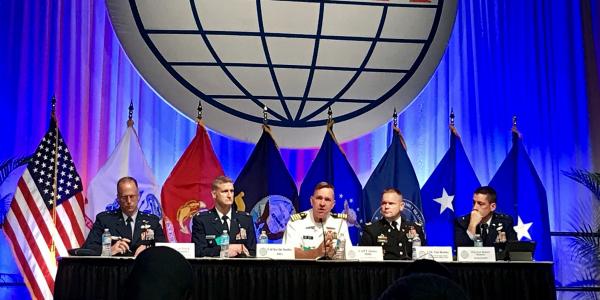Making Beat Cops Out of Cyber Warriors
In cyber, the U.S. Defense Department might have its SWAT team, but it is missing the beat cop.
In cyber, the U.S. Defense Department might have its SWAT team, but it is missing the beat cop.
And cyber operations really need that beat cop, said Brig Gen. Mark Weatherington, USAF, director of cyberspace operations at North American Aerospace Defense Command and U.S. Northern Command.
In #cyber, @DeptofDefense has a SWAT team, but doesn't have the beat cop. It needs the beat cop, say BG Weatherington at #AFCEACyber
— Sandra Jontz (@jontz_signalmag) June 13, 2017
The military is building its force of designated cyber warriors for whom all things cyber will become routine, gaining that critical day-to-day interaction that will allow them to better understand the adversary and rapidly pinpoint anomalies. But building cyber talent is just one prong of many in the government’s cyber mission, panelists shared during a discussion at AFCEA International’s Defensive Cyber Operations Symposium (DCOS), taking place this week at the Baltimore Convention Center. The event runs June 13-15.
Another prong is technology. “We need to be operate at machine speed,” said Capt. James Mills, USN, chief of staff, U.S. Fleet Cyber Command/U.S. 10th Fleet.
'We need to be operate at machine speed,' Capt. James Mills, USN, chief of staff 10th Fleet -- #AFCEACyber
— Sandra Jontz (@jontz_signalmag) June 13, 2017
The panelists addressed the dire need for DOD collaboration for success in cyber, which requires information sharing, situational awareness, innovation and teamwork.
While it is key that winning the fight means winning it as one, Gen. Weatherington said, the services presently are not equipped to play together. “We’re aren’t incentivized to do that.”
Given the size, complexity and diversity of the Defense Department, is true collaboration even possible?, one attendee asked of the panel. Maybe, they said. Probably.
Given the size of #DOD, is collaboration possible? Maybe, panelists say at #AFCEACyber.
— Sandra Jontz (@jontz_signalmag) June 13, 2017
“In the long run, we will win this as a team and we need to build in the incentives and the attitudes to do that,” Gen. Weatherington reiterated.
Some of the onus for the collaboration disconnect rests with private companies, many of which are reluctant to share proprietary yet critical information with each other or the military, said Col. Tim Brooks, USA, mission assurance branch chief for at the Army’s Cyber Directorate. The military builds so many of today’s modern day platforms, particularly weapon systems, using offerings from multiple vendors. Col. Brooks said he understands their reluctance to share what some companies might have spent millions of dollars and hours on to develop, but sometimes the military encounters problems when all those “boxes” fail to work together, he cited as an example.






Comments